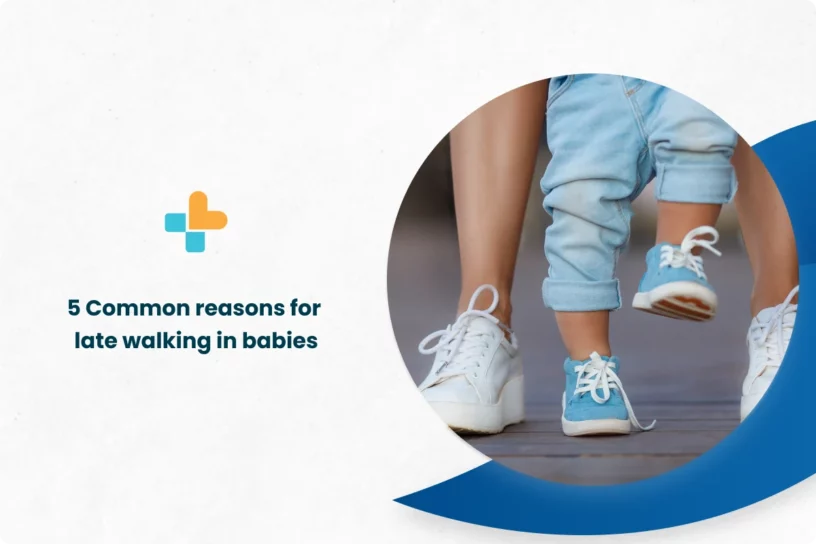Introduction
Walking is a major milestone for babies and it is an exciting time for parents to see their child take their first steps. However, some babies may take longer to begin walking than others. In this article, we will discuss the common reasons for late walking in babies and what parents can do to help their child achieve this milestone.
When do babies begin walking?
Most babies begin to take their first steps between 9 and 12 months of age, but some may begin as early as 6 months or as late as 15 months. It is important to note that every baby develops at their own pace and there is a wide range of normal.
Should you worry if your baby isn’t walking?
It is important to remember that every baby develops differently and some may take longer to begin walking than others. However, if your baby is not showing any signs of attempting to walk, such as pulling themselves up to a standing position or cruising along furniture, it may be worth discussing with your pediatrician.
What are early indicators for delayed walking?
Early indicators for delayed walking may include:
- Lack of interest in standing or cruising
- Difficulty with balance or coordination
- Delay in reaching other milestones such as crawling or sitting up
- Persistent stiffness or floppiness
What causes delayed walking in babies?
How to help your baby walk
There are several things parents can do to help their baby learn to walk:
- Encourage exploration: Provide your baby with plenty of opportunities to explore their environment, such as crawling on a playmat or walking with the help of a push toy. This will help them develop their motor skills and build the confidence they need to take their first steps.
- Support their development: As your baby begins to pull themselves up to a standing position, provide support by holding their hands or placing them in a walker. This will help them to build strength and confidence as they take their first steps.
- Physical therapy: If your baby has a condition that affects their ability to walk, such as cerebral palsy or muscular dystrophy, physical therapy can help to improve their muscle tone, coordination, and balance. A physical therapist can work with you to develop an appropriate treatment plan.
- Consult with a pediatrician: If you have concerns about your baby’s development, it’s important to consult with a pediatrician. They can assess your child and provide guidance on next steps, including referral to a specialist if necessary.
- Maintain a healthy diet: A healthy diet is essential for your baby’s growth and development. Make sure that your baby is getting enough vitamins and minerals, especially those that are important for bone and muscle development, such as calcium, phosphorous and vitamin D.
- Encourage independence: As your baby grows and becomes more mobile, it’s important to encourage their independence by giving them the opportunity to make choices and take risks in a safe environment. For example, allowing them to choose which toy they want to play with or encouraging them to climb on a low piece of furniture will help them to develop their confidence and problem-solving skills.
- Provide positive reinforcement: Praise and positive reinforcement can help to boost your baby’s confidence and encourage them to keep trying new things. When your baby takes their first steps, make sure to cheer and clap to show them how proud you are of their accomplishment.
- Be patient: It’s important to remember that every baby develops at their own pace. While some babies may begin walking at 9 months, others may take up to 15 months. Be patient and don’t compare your baby to other children.
Overall, helping your baby learn to walk requires a combination of patience, support, and encouragement. By providing opportunities for exploration, maintaining a healthy diet, and consulting with a pediatrician if necessary, parents can support their baby’s development and help them achieve this important milestone.
Neurological disorders
Neurological disorders can affect the nervous system, including the brain and spinal cord, and can lead to delayed walking in babies. Some examples of neurological disorders that can cause delayed walking include cerebral palsy, Down syndrome, and developmental delays. These disorders can affect a baby’s muscle tone, coordination, and ability to learn and perform new motor skills.
Muscular dystrophy/muscular issues
Muscular dystrophy and other muscular issues can also lead to delayed walking in babies. These conditions can cause muscle weakness and difficulty with coordination, making it harder for babies to learn to walk. Examples of muscular dystrophies include Duchenne muscular dystrophy and Becker muscular dystrophy. These conditions are caused by genetic mutations that affect muscle development and function.
It’s important to consult with a pediatrician or genetic specialist if you suspect that your baby may have a neurological disorder or muscular issue. They will be able to provide a proper diagnosis and guide you through the appropriate treatment options and therapies that can help your baby to achieve their milest
Vitamin D deficiency
Vitamin D is essential for the proper development of bones and muscles. A deficiency in vitamin D can lead to delayed walking in babies as it can cause weak bones and muscles.
Rickets
Rickets is a condition caused by a deficiency of vitamin D, calcium, or phosphorus. It can lead to weak bones and delayed walking in babies.
Hypothyroidism
Hypothyroidism is a condition in which the thyroid gland does not produce enough hormones. It can lead to delayed walking in babies as it can cause muscle weakness and poor coordination.
Motor skills and walking
Some babies may have difficulty with the motor skills required for walking, such as balance and coordination.
Hereditary
Delayed walking can also be inherited from parents.
Prematurity
Premature babies may take longer to reach milestones such as walking, due to the fact that their bodies and brains may not have fully developed yet.
Other reasons
Other reasons for delayed walking in babies may include obesity, congenital defects, or certain medical conditions.
How do babies learn to walk?
Babies learn to walk through a process of exploration and experimentation. They begin by crawling and pulling themselves up to a standing position. As they gain strength and confidence, they begin to take their first step
How to help your baby walk
When to see a doctor
If you are concerned about your baby’s delayed walking, it is important to consult with a pediatrician. They can assess your child and provide guidance on next steps.
Conclusion
Delayed walking in babies can be caused by a variety of factors, including neurological disorders, muscular issues, vitamin deficiencies, and other medical conditions. It is important for parents to be aware of early indicators for delayed walking and to consult with a pediatrician if they have concerns. While some babies may take longer to begin walking, there are ways to help support your child in reaching this milestone, such as providing opportunities for exploration and physical activity, and consulting with a pediatrician or physical therapist for guidance. It’s important to keep in mind that every baby develops at their own pace and that there is a wide range of normal.
FAQs:
When should I worry that my baby is not walking?
It is typical for babies to start walking between 9 and 18 months of age, so if your baby has not taken their first steps by 18 months, it may be worth discussing with your pediatrician. However, some babies may develop at a different pace and may start walking later.
What age is considered delayed for walking?
Delayed walking is generally considered to be when a baby has not taken their first steps by 18 months of age. However, it is important to keep in mind that every baby develops at their own pace and some may take longer to reach this milestone.
Do some babies walk late?
Yes, some babies may start walking later than others. It is normal for babies to develop at their own pace and some may take longer to reach milestones such as walking. Factors such as muscle tone, weight, and overall health can also play a role in when a baby starts walking. If you have concerns about your baby’s development, it is best to consult with your pediatrician.
Our Hospital Locations
Pediatrics Surgery Hospitals in Chandigarh | Pediatrics Surgery Hospitals in Bangalore | Pediatrics Surgery Hospitals in Jaipur | Pediatrics Surgery Hospitals in NCR | Pediatrics Surgery Hospitals in Hyderabad
Our Doctors
Pediatrics Surgery Doctors in Chandigarh | Pediatrics Surgery Doctors in Bangalore | Pediatrics Surgery Doctors in Jaipur | Pediatrics Surgery Doctors in NCR | Pediatrics Surgery Doctors in Hyderabad
About the Author

Dr. S. Goel
Dr. S. Goel is a renowned Internal Medicine Specialist currently practicing at Ayu Health, Bangalore. He is a Specialist in Internal Medicine, Diabetes HTN, Paediatric Care, and Family Medicine.




